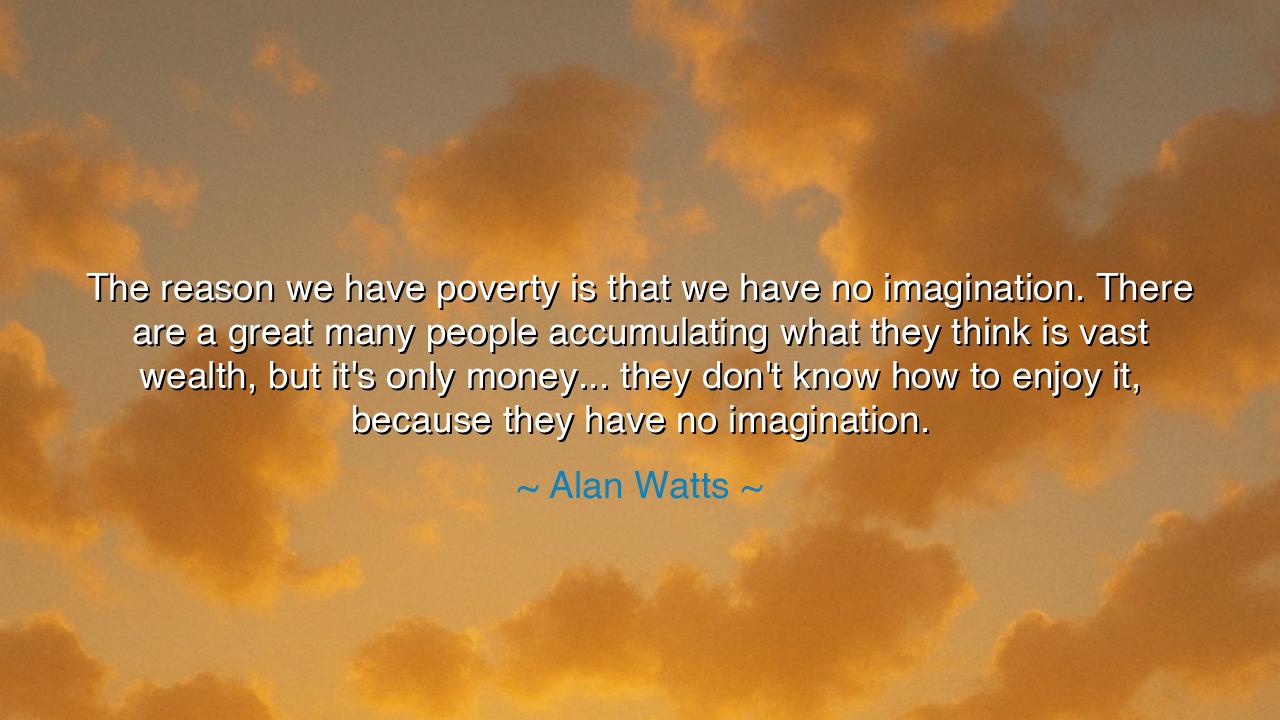
The reason we have poverty is that we have no imagination. There
The reason we have poverty is that we have no imagination. There are a great many people accumulating what they think is vast wealth, but it's only money... they don't know how to enjoy it, because they have no imagination.






“The reason we have poverty is that we have no imagination. There are a great many people accumulating what they think is vast wealth, but it’s only money… they don’t know how to enjoy it, because they have no imagination.” Thus spoke Alan Watts, the philosopher of spirit and paradox, whose voice was both thunder and song — a bridge between the East and the West, between wisdom and wonder. In these words, Watts reveals a truth deeper than economics: that poverty is not merely the absence of money, but the absence of imagination — the sacred power to see, to create, to rejoice. He declares that humanity’s suffering does not spring from lack, but from blindness — from the failure to imagine abundance in the world that already surrounds us.
When Watts speaks of imagination, he does not mean fantasy or idle dream. He means the creative vision of the soul — the ability to perceive life as art, to shape meaning out of experience, to transform existence into joy. The poor in imagination are not only those without possessions, but those who possess everything and see nothing. They hoard gold, yet starve for wonder. They count their money, but not their blessings. And so they live in a poverty more profound than hunger — the poverty of spirit, the famine of joy. For what is wealth without the power to delight in it? What is possession without perception?
This truth has echoed through ages long before Watts gave it voice. The ancient Stoics knew that happiness lies not in ownership but in outlook. Seneca, born to wealth, wrote that the miser and the beggar suffer alike — both are consumed by what they lack. The true treasure, he said, is not in one’s vaults but in one’s mind. Likewise, Watts’s words recall the wisdom of the East — that the world is abundance itself, a ceaseless dance of form and color and life, but man’s imagination has dimmed, and he walks through paradise as though it were a desert. Thus, the poverty of imagination is the root of all misery — for without vision, the soul cannot see the feast laid before it.
History, too, bears witness to this truth. In the time of Vincent van Gogh, the artist lived poor in coin yet rich in vision. Though his pockets were empty, his heart overflowed. He painted the stars not as cold or distant, but alive with divine fire. He found heaven in the fields of wheat and eternity in a cup of sunflowers. Society called him poor, but who was truly impoverished — the man who saw glory in the ordinary, or those who passed by blind to beauty? In Van Gogh’s eyes, we see what Watts meant: that imagination transforms poverty into wealth, while its absence turns wealth into emptiness.
Watts also warns us that modern civilization, in its obsession with accumulation, has lost its creative soul. We have made gods of numbers, priests of commerce, temples of glass and steel — yet we have forgotten how to enjoy the simple miracle of being. The world has never been richer in material, yet never poorer in meaning. We chase profit but neglect presence; we own objects but not awe. We are so busy earning a living that we forget to live. Watts’s lament is thus a prophecy: unless imagination is restored to its throne, humanity will drown in its own abundance, rich in things but poor in spirit.
The lesson, therefore, is this: reclaim your imagination. Learn to see with the eyes of wonder. When you walk among trees, hear their music; when you eat, taste the earth’s generosity; when you work, let creativity breathe through your hands. Wealth is not what you have — it is what you perceive. The imaginative spirit transforms every act into art, every day into a poem. You may not control your circumstances, but you can control your vision. To live imaginatively is to live richly, regardless of possession.
So, dear seeker, remember this truth: poverty ends where imagination begins. For those who can imagine beauty in the ordinary, love in the fleeting, joy in the small, will never be poor. Let your life become a canvas upon which your soul paints meaning. Let your mind be the treasury of wonder. For when you awaken the imagination within you, you will discover that abundance is not something to be earned — it is something to be seen, felt, and lived. And then, as Watts promised, you will know the true wealth that no coin can measure — the wealth of the imaginative heart, forever free.






AAdministratorAdministrator
Welcome, honored guests. Please leave a comment, we will respond soon